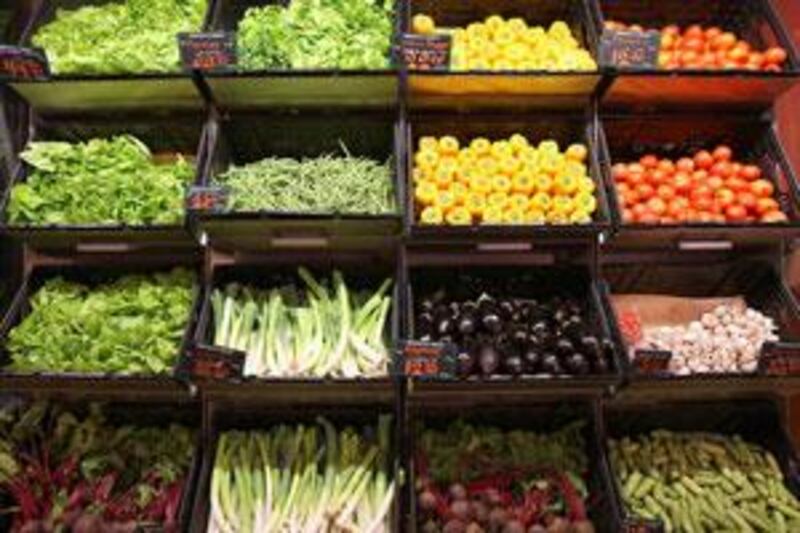Samantha McBride, who lives in Dubai but is originally from Toronto, Canada, shops regularly at Organic Foods and Cafe in the emirate, but she acknowledges there are few outlets and options in the UAE when searching for natural food, healthy snacks and fortified drinks.
"Things like low-fat cheese strings that you would be able to find at home," she says. "There is just not a lot of snack options for kids which are healthy here." But Mrs McBride is about to find a lot more choice. From low-fat and low-sugar frozen desserts to organic vegetables and flour for diabetics, food producers are rolling out new products to cash in on growing health consciousness in the Emirates.
"When you look at the consumer data, it tells you that the consumer is looking for healthy alternatives," says Michael Henderson, the chief operating officer of National Food Products, an Abu Dhabi company that is introducing a new line of juices featuring vitamin-rich "superfruits" such as pomegranate. People "are much more health-conscious and they are looking for brands to bring them healthier options".
Many food manufacturers are moving into the organics sector. IFFCO, one of the largest food makers in the region, plans to introduce new organic products to the market within six months. National Food Products recently launched a line of fresh juices with no additives. Al Ghurair Foods, based in Dubai, has launched a high-fibre, low-calorie flour for those with diabetes, while the Saudi dairy company Almarai in 2008 introduced a fermented milk product called Trim that is aimed at helping people lose weight.
At least five retailers of frozen yoghurt or low-fat, low-sugar ice cream are already operating outlets in the UAE or planning to open here this year. Al Yasra Food, a Kuwaiti company, is investing between US$50 million (Dh183.6m) and $100m to expand its organics division in the UAE during the next five to 10 years. The growing market for healthy food products across the Middle East is expected to be worth $10.5 billion this year, data from the research company Euromonitor shows. It is projected to grow to $11.8bn by 2012.
Analysts say this market will continue to increase as food-linked disorders such as diabetes and childhood obesity become more common in the region, and consumers pay more attention to nutrition. The health statistics are dire. One in five people in the UAE has diabetes, the second-highest rate in the world, the UN World Health Organisation says. One in eight children in the Emirates is classed as obese, also one of the highest rates in the world, the UN says.
"With troubling rates of childhood obesity in the UAE, the government is taking initiatives to change children's eating habits at school and parents are following suit at home," says Gayatri Bhasin, Euromonitor's research analyst for the Middle East and Africa. "As a result, healthy alternatives to popular treats like confectionery, ice cream and biscuits are becoming increasingly popular." Now, parents are opting for fruit juices instead of carbonated drinks and snack bars instead of chocolate bars for their children and also themselves, she says.
"The shift towards healthier eating will only gain momentum over the next few years, and manufacturers of impulse and indulgence products are likely to reposition their brands and offer a wider range of healthy, natural products," Ms Bhasin says. But Nils el Accad, the chief executive of the Organic Foods and Cafe line of restaurants and grocery stores in Dubai, is somewhat sceptical. Healthier products are perceived as coming with a premium price, and many consumers in Dubai are becoming more budget-conscious after the economic downturn.
"People perceive it as more expensive, not necessarily that it is, but it's a perception," he says. "People want to save a buck at a time like this." Recent research supports his theory. A survey conducted by the online market research company YouGov last year showed that 21 per cent of UAE residents who used to buy organic foods were no longer doing so. Of the 33 per cent who said they had not bought organic food at all, two thirds cited the high cost.
Sales at the Organic Foods and Cafe outlets are down from last year, Mr el Accad says. This is in part due to thriftier shoppers, but he also estimates that thousands of middle-class residents, a key demographic for these products, were laid off during the economic downturn and had left the UAE. Mr el Accad is also concerned that some products may be marketed as healthier, or organic, but are not actually better for consumers.
"It would be great if there was a location where consumers can go and inquire what specific claims mean, and these claims can be checked by the authorities for authenticity. The average person doesn't actually know most of these things," Mr el Accad says. "You have got to be really interested and read up about this, so I don't think the awareness is there." David Edwards, the managing director of IMES Consulting Group, based in Dubai, says consumers are generally moving towards healthy eating but that the shift will not happen overnight.
"It takes time for people's habits to change, and gradually they will," Mr Edwards says. "And I believe that retailers will develop more space for healthier foods." @Email:aligaya@thenational.ae





